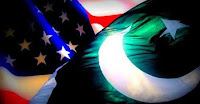Pakistan: Can the rulers develop consensus?
According to the results of recently held elections all the
political parties enjoy the status of ruling junta. If members of some of these
parties will be sitting on opposition benches in the national assembly, they
will form the government at provincial levels.
Interestingly, MQM that has
remained part of ruling junta has decided to sit on opposition benches at the
federal as well as provincial levels. Under the emerging set up it is expected that
the parties will preferably come up with policies through consensus and avoid
confrontation.
The real test of their consensus is deciding fate of the drone
attacks. All the parties during their election campaign were critical of these
attacks and now the time has come to tell the super power ‘enough is enough’. It
is expected that prime minister in waiting, Mian Nawaz Sharif may not be able
to convince the United States alone but if he enjoys support of all the elected
members, he can negotiate a better deal.
In the worst scenario Pakistan has the right to intercept
and down any aircraft breaching its airspace.
However, it is believed that
these attacks enjoy the blessing of Government of Pakistan (GoP), which is also
extending ground support. It is often alleged that Pakistan provide the
necessary details for these attacks because at times undertaking such precise
attacks are not possible from ground.
The classification of Taliban into good and bad and
Taliban/TTP extending support to JI, JUI-F, PML-N and PTI is not likely to
allow the ruling junta to continue support for drone attacks. Many questions
bother Pakistanis, what is the reality of Taliban/TTP? Are they friend or foe?
If they are friend why are they at war with Pakistan Army?
One of the ways to rationalize good or bad Taliban is, those
who cooperate with US-led Nato forces are called good and those who consider
them ‘occupier’ have been clasified bad. Though, it has been decided to
withdraw Nato forces from Afghanistan, there are fears that there will never be
complete withdrawal. United States will retain bases in Afghanistan, party to
keep Iran under pressure and partly to get control over the goods going to
Central Asian countries via Afghanistan.
In Afghanistan United States is also supporting India in maintaining
its hegemony; in fact the US wants the countries located in the region to
accept India as a regional power. This is aimed at keeping Pakistan under
pressure. In such a scenario Mian Sahib may find granting India MFN status a
difficult task. His other associates, religious parties are also not likely to
support him in developing too cordial relationships with India.
To overcome energy crisis Mian Sahib is demanding Rs500
billion, which has to be mobilized through imposing new taxes and/or raising rates
of existing taxes. It is feared that he may also resort to hike in electricity
and gas tariff, which will not be endorsed by his opponents.
Ironically, Mian Sahib has not come up with any policy to
contain rampant pilferage of electricity and gas and recovery of outstanding
dues. It is necessary to remind him that hike in tariffs just can’t improve
cash flow of electric and gas utilities.
Targeted killing has once again resurfaced in Karachi and
the worst victim is Shia community. Ironically, some of the religious parties
and banned outfits enjoy most cordial relationship with PML-N. The time has
come to catch the perpetrators and give them exemplary punishment.












